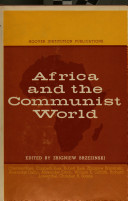 My research report to the Open Society Archives turned out to be a draft of a lengthy working paper that summarizes some of the materials I have been working with. You can read about my OSA research proposal here.
My research report to the Open Society Archives turned out to be a draft of a lengthy working paper that summarizes some of the materials I have been working with. You can read about my OSA research proposal here.
Even from this vastly text I had to leave out a lot of other materials. Unfortunately I will only have time to work again on this later, so I decided to share here some thoughts that could not be included.
One of the books that were very influential to me (but haven’t included into the draft) gave me a great overview of the early Eastern European relations towards decolonizing/ed Africa (the “Third World”). What I find most interesting is not only the relative autonomy of the Eastern Bloc in developing their foreign relations, but also the continuities between previous colonial era and postcolonial relations. Another issue is the role of China, not only how the Sino-Soviet split influenced the Soviet Union to maintain the relative autonomy of the Eastern Bloc, but also China’s early postcolonial trajectories in gaining a foothold in Africa.

“By 1958, well before substantial new opportunities arose south of the Sahara, East Europe’s trade with Asia, the Middle East, and some parts of Africa was already greater than that of the Soviet Union; ithad more than doubled since 1954 and amounted to approximately five per cent of the area’s total trade. Some of this commercial activity, of course, was no more than a partial return to normal trade patterns that had been interrupted by the war and later inhibited for political and ideological reasons. Yet the very fact that old patterns existed and could be resumed was important, since the arrival of East European traders and governmental representatives in Africa did not appear to the new states as a novel or menacing overture, but rather as a natural resumption of established policies.”
— Robert and Elizabeth Bass: Eastern Europe, in: Zbigniew Brzezinski: Africa and the Communist World, Hoover Institution, 1963, p. 88.